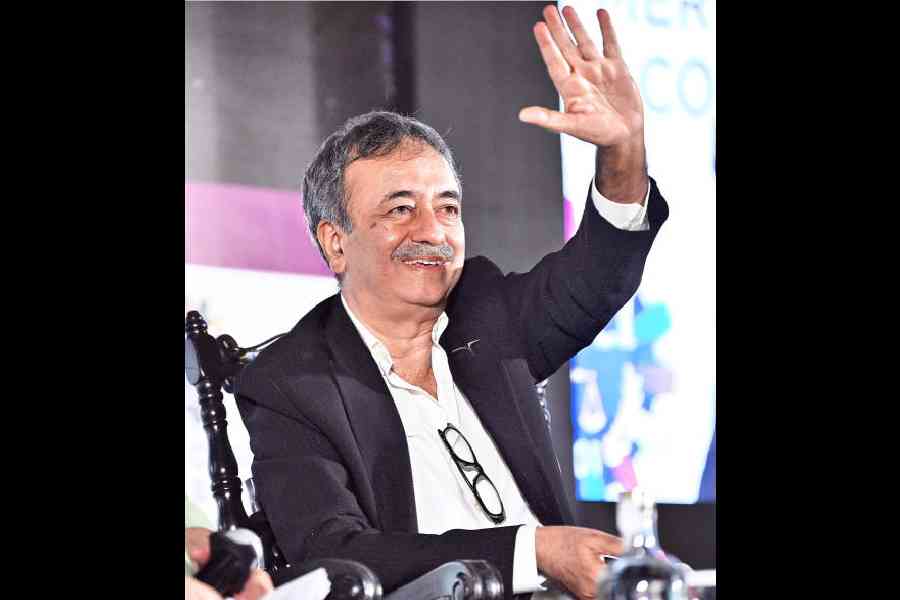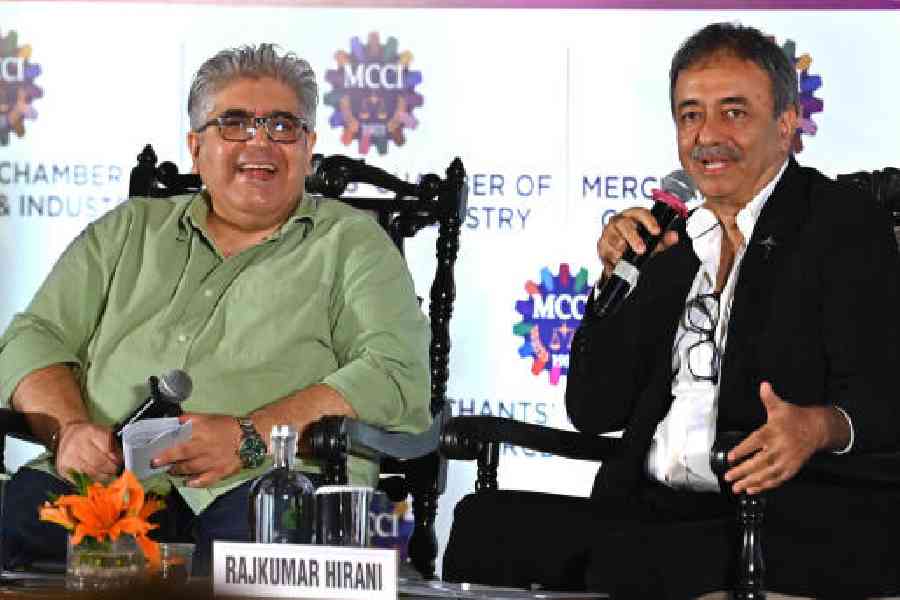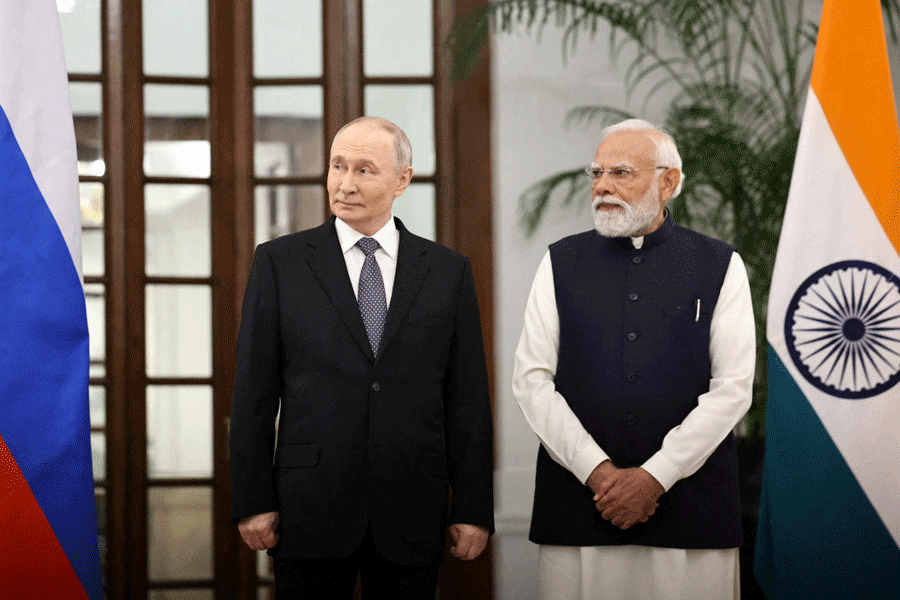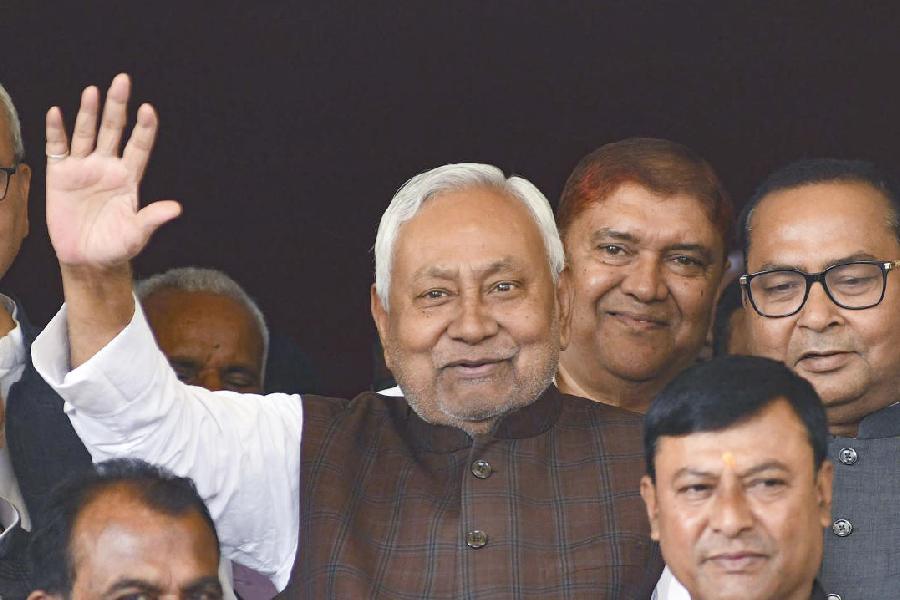The teasers of Rajkumar Hirani’s films — Munna Bhai M.B.B.S, 3 Idiots, PK, Sanju and others — refreshed our memories and served as hors d’oeuvres before a full-course meal unveiled itself in a chat led by Rajeev Masand at a special session organised by the Merchants’ Chamber of Commerce and Industry, titled ‘The Role of Film and Storytelling in Business and Industry’. Held at Taj Bengal on October 4, the almost one-hour session covered everything from Hirani’s process of crafting a story and character to believing in his instincts and letting his son follow his heart, leaving the audience satiated, just like a hearty meal. All we yearned for was more heartwarming films from the humble director. Excerpts.

Not cynical but grounded
Cynicism doesn’t take you anywhere. I think cynicism is a form of escape mechanism. It just makes you feel superior. The moment you start criticising somebody, the moment you project a pessimistic view about something, you suddenly feel superior. I am not part of that. It really leads you nowhere. I always try to see hope and positivity in everything. The aim should be to find some solutions and move ahead.
New film, like a
start-up
If I were to talk in business parlance, I would say every new film is like a new start-up. It starts with a lot of panic and confusion, I would say. Where does the idea come from? It could be anything: a newspaper headline, a thought, or sometimes it could be a character. So, there’s no fixed rule. If I have to go back to my own films, then Munna Bhai M.B.B.S and 3 Idiots came from the world of colleges. The story and the characters attract people. You identify with the character on screen. You want to live that person’s journey. You want to resonate with his wants. So PK started with the character, an alien and his fluid journey on Earth.
Instinct is the best judge
Instinct is the first thing that I rely on. If you don’t have the instinct, then you become dependent on somebody else’s instinct. Somewhere, you have to believe in your script. However, at the same time, you do have to narrate it to many people to see how they react to the story. In that narrative, you have to keep market research. But, honestly, I get very worried about market research many times, because if you’re not present there as a creator, it is the most dangerous thing to do, I feel. So, I do tons of narrations at the script level and after the film is made. And also sift the responses, and there comes your instinct. There’s no better way to judge it than by instinct.
Entertainer or commentator?
I went to a film school just to come out and entertain. There was no idea of preaching. We have Sadhgurus and self-help books for preaching. See, nobody goes to a cinema to get gyaan but to get entertained. Obviously, you don’t have to sell your soul to entertain to that extent, where you start doing something stupid. But the primary job is to entertain and if any messaging comes in, it comes in because of your beliefs. So, when I set out to do 3 Idiots, my idea was not to comment on the education system.
Does a storyteller have a responsibility?
Our responsibility is as much as a parent’s responsibility towards their child or a politician’s responsibility to their country, or as business people, your responsibility towards your product. You just need to be honest. I don’t think the load should be that because you’re making cinema and there are different kinds of cinema — religious films, spiritual films, revenge films.
We have around 11,000 theatres in India. How many temples do we have? A thousand times more. Ab jab Bhagwan yeh moral ground theek nahi kar paye, toh cinema kya karlega? My dad was a
product of Partition, and he would say he learnt so much from cinema. So people might pick up different cues from cinema. Ultimately, cinema is a reflection of our times, what’s happening in that period, so we obviously will pick up things from cinema. But as I say, the load should not be on cinema.
Mediocre cinema will die
Cinema has been hugely affected post-Covid by all the OTT platforms. Habits have changed, people are now watching more content at home, but that is happening out of sheer convenience and choice. I see most people are watching films on mobile phones now, but the moment you walk into a theatre, you know the films are designed for cinema halls. The landscape, the way we shoot it, the sound… you don’t get to hear five per cent of the sound that it’s been designed for. Nobody wants to lose out on the business, so what you guys will watch in the next three-four years is going to be at another level, which you will not be able to see on your phones.
Also, a very important point is that mediocrity will die. People will go out only for films which they hear are great. For mediocre films, people won’t go; they’ll watch it at home. Cinema offers a collective sort of immersive experience. I hope cinemas stay alive.
Success and risk
With success, you obviously get the freedom to do what you want to do. You can take more risks. It gives you the strength to be able to do something different and take chances. However, you want your next film to be successful. So somewhere it can scare you a little that you want that sixer on every ball. But I think you have to keep your sanity alive and go with your instincts. The moment you start listening to a lot of people, it’s scary. I have never felt burdened because I’ve taken chances. When my films don’t do well, I think about it deeply. Cinema is like food. Certain people will like a certain kind of food, certain people won’t. It’s so taste-oriented, to be honest. Till now, I have chosen subjects which were more relatable to people. I remember Aditya Chopra once told me, ‘If you feel this got less love, don’t change your style of filmmaking. Just stick to your guns.’
Does failure teach you more than success?
Of course, failure can teach you a lot of things and even success. Failure can make someone tank completely and change the course of their life. It will make you see your flaws, but if you’re strong enough, you’ll come back.
Advice for young guns
I have a 26-year-old kid now, and I’ve learned not to give advice. Let them find their own path. They will discover it. I think my son was in the ninth or 10th standard when he made his first short film. It was a good one, and I thought he would grow up to make good cinema, and I am sorted. Then, after class 12, he worked with me on Sanju for six-seven months and announced that he wants to be an actor. I thought he was saying this under the influence of Ranbir Kapoor. I tried everything to discourage him by informing him that it might look very glamorous, but it’s very tough as an actor. Then he cited a dialogue from my own film, and he won the argument.











